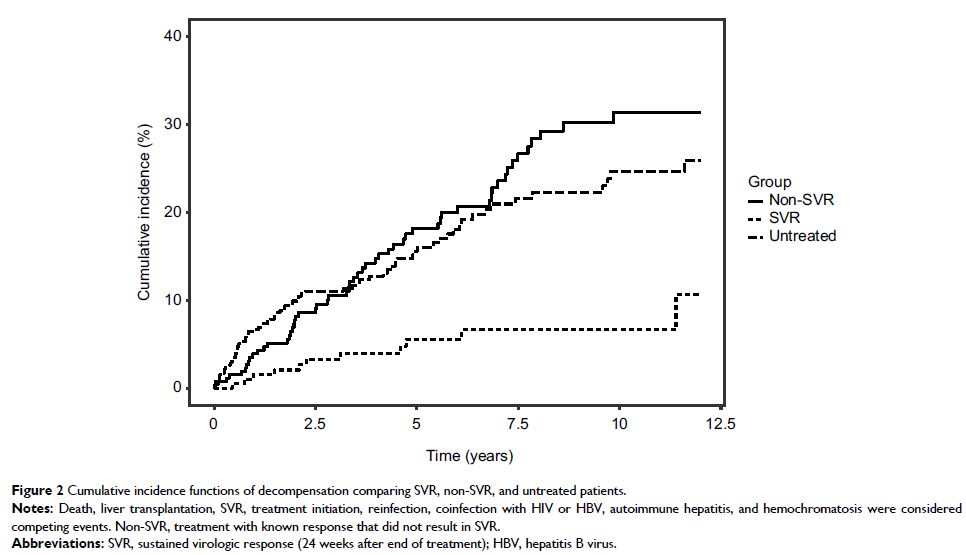108985
论文已发表
注册即可获取德孚的最新动态
IF 收录期刊
- 3.4 Breast Cancer (Dove Med Press)
- 3.2 Clin Epidemiol
- 2.6 Cancer Manag Res
- 2.9 Infect Drug Resist
- 3.7 Clin Interv Aging
- 5.1 Drug Des Dev Ther
- 3.1 Int J Chronic Obstr
- 6.6 Int J Nanomed
- 2.6 Int J Women's Health
- 2.9 Neuropsych Dis Treat
- 2.8 OncoTargets Ther
- 2.0 Patient Prefer Adher
- 2.2 Ther Clin Risk Manag
- 2.5 J Pain Res
- 3.0 Diabet Metab Synd Ob
- 3.2 Psychol Res Behav Ma
- 3.4 Nat Sci Sleep
- 1.8 Pharmgenomics Pers Med
- 2.0 Risk Manag Healthc Policy
- 4.1 J Inflamm Res
- 2.0 Int J Gen Med
- 3.4 J Hepatocell Carcinoma
- 3.0 J Asthma Allergy
- 2.2 Clin Cosmet Investig Dermatol
- 2.4 J Multidiscip Healthc

Liver-related morbidity and mortality in patients with chronic hepatitis C and cirrhosis with and without sustained virologic response
Authors Hallager S, Ladelund S, Christensen PB, Kjær M, Thorup Roege B, Grønbæk KE, Belard E, Barfod TS, Madsen LG, Gerstoft J, Tarp B, Krarup HB, Weis N
Received 10 January 2017
Accepted for publication 5 July 2017
Published 24 October 2017 Volume 2017:9 Pages 501—516
DOI https://doi.org/10.2147/CLEP.S132072
Checked for plagiarism Yes
Review by Single-blind
Peer reviewers approved by Dr Amy Norman
Peer reviewer comments 5
Editor who approved publication: Professor Henrik Toft Sorensen
Background: Chronic hepatitis C (CHC) causes liver cirrhosis in 5%–20% of patients,
leading to increased morbidity and mortality. This study aimed to estimate
liver-related morbidity and mortality among patients with CHC and cirrhosis in
Denmark with and without antiviral treatment and sustained virologic response
(SVR). Furthermore we aimed to estimate the rate of hepatocellular carcinoma
(HCC) and decompensation associated with certain prognostic factors.
Materials and
methods: Patients with CHC and cirrhosis
registered in the Danish Database for Hepatitis B and C were eligible.
Cirrhosis was based on liver biopsy, transient elastography, and clinical
cirrhosis. Data were extracted from nationwide registries. The study period was
from 2002 until 2013.
Results: Of 1,038 patients included, 716 (69%) were male and the median age
was 52 years. Median follow-up was 3.8 years, 360 patients died, and 233 of 519
treated patients achieved SVR. Alcohol overuse and hepatitis C virus genotype 3
were associated with an increased incidence rate (IR) of HCC, whereas diabetes
and alcohol overuse were associated with increased IRs of decompensation.
Achieving SVR reduced all-cause mortality (adjusted mortality rate ratio 0.68
[95% CI 0.43–1.09]) and liver-related mortality (mortality rate ratio 0.6 [95%
CI 0.36–1]), as well as liver-related morbidity with adjusted IR ratios of 0.37
(95% CI 0.22–0.62) for HCC and 0.31 (95% CI 0.17–0.57) for decompensation. The
IRs of HCC and decompensation remained elevated in patients with alcohol
overuse after SVR.
Conclusion: Alcohol overuse, hepatitis C genotype 3, and diabetes were associated
with liver-related morbidity in patients with CHC and cirrhosis. SVR markedly
reduced liver-related morbidity and mortality; however, special attention to
patients with alcohol overuse should continue after SVR.
Keywords: chronic hepatitis C, cirrhosis, liver-related morbidity, cohort study,
sustained virologic response
